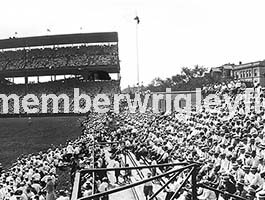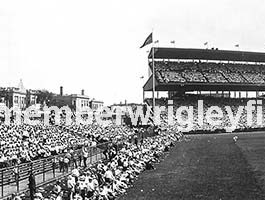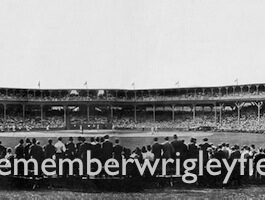1914 Weeghman Park Opening Day
$74.95 – $459.95
Description
It is a splendid day for a walk down Addison Street in 1914 for Weeghman Park Opening Day. The flamboyant owner Charles A. Weeghman is here to watch his Chicago Federals, or “Chi-Feds,” of the Federal League. After the inaugural season, he renames the team as the Whales in 1915. Zachary Taylor Davis is the architect of the park, which seats 14,000. Ironically, it also is Taylor who is responsible for Comiskey Park, which opened in 1910.
When the Federal League folds after the 1915 season, Weeghman organizes a group to buy the Chicago Cubs for $500,000. It’s really a merger with his former Whales players. In 1915, the Cubs are playing in dilapidated, wooden West Side Park, at Polk and Taylor streets west of downtown. But now the team has a brand new north side home. The Cubs celebrate their first Weeghman Park Opening Day on April 20, 1916.
By 1919, the park is known as “Cubs Park.” William Wrigley Jr., a partner in the ownership group, takes over in 1921. Soon after, the stadium has its first renovation, a major expansion in 1922-23 that takes its capacity to 30,000. Prior to the 1927 season, the park is formally dedicated as Wrigley Field. Wrigley adds a second deck in 1927-28. And, finally, in 1937, he adds the bleachers, ivy and hand-operated scoreboard.
Small changes, such as the clock addition in 1941, take place over the next several decades. This culminates with lights (1988), two jumbotrons (2015) and a World Series championship (2016)! Learn more about this print in About and Frequently Asked Questions. Or visit the Shop for more ideas.
Additional information
| Dimensions | N/A |
|---|---|
| Product | Canvas Print |
| Color | |
| Sizes |
Related products
-
- Baseball, Stadiums, Wrigley Field, Vintage Fashion
1929 Wrigley Field Left Field Bleachers (pt. 1)
- $169.95
- Select options This product has multiple variants. The options may be chosen on the product page
-
- Baseball, Stadiums, Wrigley Field, Vintage Fashion
1929 Wrigley Field Right Field Bleachers (pt. 2)
- $169.95
- Select options This product has multiple variants. The options may be chosen on the product page
-
- Baseball, Stadiums, West Side Park, Vintage Fashion
1908 West Side Park
- $169.95
- Select options This product has multiple variants. The options may be chosen on the product page




